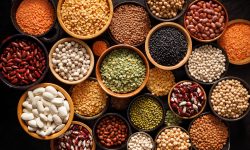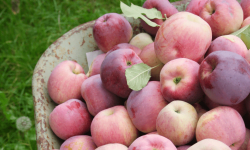Donating 10,000 meals in Pulses! For #WorldPulsesDay Spud is donating 10,000 meals worth with pulses…
It’s another superfood showdown. This time, we’re matching flax seeds up against chia seeds. To start off, they’ve both got a tonne of omega-3 fatty acid, fibre, and micronutrient content. They’re also high in calories, which makes them terrific energy fuels.
Both seeds are very popular, go in your smoothies, acai bowls, oatmeal—anything we can throw them in, it seems like—and they both make vegan eggs, but which one is healthier? Seriously, if you could only bring one to a deserted island, which should you pick?
Flaxseeds
Flaxseeds have been around for millennia, but it wasn’t only until recently that they’ve been getting the hype they deserve. Remember a decade or two ago, all the products you could find for flaxseeds were stale crackers and grainy bread? The dark days are over for flaxseeds. As they’ve established their rightful place amongst healthy foods, everyone is accepting them as they what are.
In terms of nutritional values, there isn’t much downside to flaxseeds. In terms of taste, they are considerably stronger and oilier than chia seeds, so that’s definitely something to consider when incorporating these seeds in your recipes. And an important thing to note is that flaxseeds must be ground as the human body isn’t capable of breaking down their rigid outer shell to access its nutrients. All you would get is fibre slipping through your bowels!
Flaxseeds Benefits
While these two seeds are very similar in terms of nutritional values, there are some slight differences. Flaxseeds are definitely the “fattier” seed of this match-up. But that might not necessarily be a negative. For those who are in need of more energy fuel or do more intensive activity, some flax seeds blended in a nice protein shake might be the better way to go. Flax seeds are also higher in protein and lower in carbs by a hair.
Flaxseeds are also higher in magnesium and potassium, which are both essential for muscle function. With a good content of copper, zinc, iron, manganese, and phosphorus—all of which are higher than chia seeds—flax seeds are one of the best sources of essential minerals.
But that’s not even really where flaxseeds shine most. Flax seeds are the number one source of lignan, which may help combat certain forms of breast cancer, osteoporosis, and cardiovascular diseases, as well as alleviating hormonal symptoms of menopause.
Chia Seeds
I know, it seems like flaxseeds have already taken the cake in this showdown, but chia seeds are more than just some gelatinous blob thingies that help thicken your morning smoothies. But before we delve into the nutritional values of chia seeds, let’s talk about some obvious advantages they have over flaxseeds.
They’re much milder in taste, so if you don’t want a healthy seed supplement to overpower your recipe, chia seeds are definitely the way to go. You also don’t have to grind them up to access their nutrients. Pop them in liquid and they instantly become pudding—that’s a win in itself, right?! Still, they’re much more than that. These tiny seeds have been cultivated by the Aztec since the fifteenth century, and for very good reasons.
Chia Seeds Benefits
While chia seeds are slightly lower in protein and omega-3 acids, they are still a fantastic source of these vital nutrients. In terms of calcium, fibre, and phosphorus, however, chia seeds are superior. In fact, they’re more than double the calcium found in flaxseeds. A higher fibre content also means that you’ll feel full longer after a meal, your blood sugar level will be regulated, your cholesterol level will be healthier, and your bowel movements will be easy and breezy.
What about micronutrients? Although they don’t pack as much of magnesium, potassium, vitamin B1, folate, and copper as flaxseeds, they are still great sources nonetheless. They do exceed flaxseeds in selenium content, however, a powerful antioxidant that helps lower risks of heart disease and cancer. And along with the lignan content also found in chia seeds, these seeds are undoubtedly a valuable ingredient to fight cancer.
What’s the verdict?
Although flaxseeds are higher in more nutrients, we’ve got to give this one up to individual needs. If you’re looking for more protein, magnesium, potassium, vitamin B1, folate, copper, and omega-3 fatty acids in your diet, make flaxseeds your top choice. But if you’re wanting more fibre, calcium, phosphorus, and a lower fat content, chia seeds are the better option for you.
If you’re simply looking for a supplement with no specific nutrients in mind, go with your preference. Chia seeds are effortless and tasteless, which means they are perfect in just about anything. Flaxseeds, on the other hand, will provide nuttier and more flavourful notes and would work wonderfully in baked goods.
It’s always good to experiment with both and see what works best for your palate and your body. Let us know which one you prefer!



